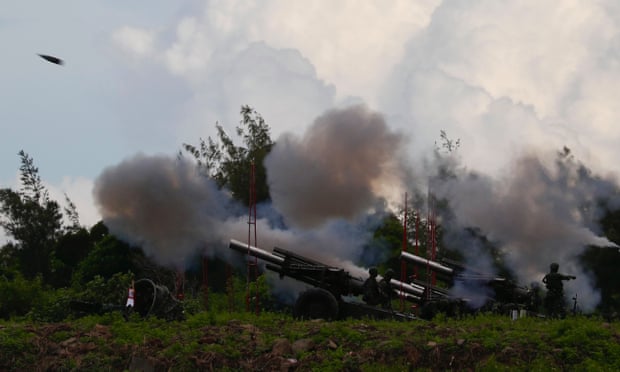[ad_1]
China used its military drills last week to prepare for an invasion of Taiwan, and its anger over US speaker Nancy Pelosi’s visit was just an excuse, Taiwan’s foreign minister has said.
The minister, Joseph Wu, addressed the media on Tuesday morning, as China’s People’s Liberation Army (PLA) continued with military exercises it began last week, and Taiwan started its own live-fire drills. Wu accused China of “gross violations of international law”.
“China has used the drills in its military playbook to prepare for the invasion of Taiwan,” he said. “It is conducting large-scale military exercises and missile launches, as well as cyber-attacks, disinformation, and economic coercion, in an attempt to weaken public morale in Taiwan.”
He said the PLA activities would have taken far longer to prepare than the timeframe of it being a direct response to Pelosi’s visit.
Wu said China’s tactics, including the firing of ballistic missiles, were “clearly trying to deter other countries from interfering in its attempt to invade Taiwan”, and also showed that it had much broader geostrategic intentions.
“China’s real intention is to alter the status quo in the Taiwan Strait and the entire region.”
Beijing has declared ownership of the Taiwan strait, one of the world’s busiest shipping routes, and aims to influence the international community’s freedom of travel, by controlling the stretch of water and linking the Yellow Sea to the South China Sea, he said.
In the past week the PLA has conducted more than 100 sea and air crossings of the median line, an unofficial border between China and Taiwan which until recently both sides had largely respected.
On Tuesday Wu said China has taken “specific action to break the longstanding tacit agreement of the median line”, and would probably now try to “routinise its actions”.
“Its intentions are not likely to end there,” he said, noting the security agreement with Solomon Islands, and China’s influence across the Pacific, south-east Asia, Africa and Latin America.

Last week government websites, convenience stores, and train station signs were targeted by cyber-attacks. Wu said the varying attacks were traced to China and Russia, across several days. Overseas cyberattacks were continuing and Taiwan’s authorities remained on “high alert”, Wu said, but Taiwan would not be cowed.
“China’s continued attempt to intimidate Taiwan will not panic us, nor will they defeat us. The values of freedom and democracy cannot be taken away.”
Taiwan began its own live-fire military drills on Tuesday, in Pingtung county in the south of the main island. The exercises are designed to simulate defensive operations against an attack on the island. A Taiwan military spokesperson told AFP the drills were previously scheduled. Taiwan holds annual military drills, traditionally around this time of year. The week before Pelosi’s visit, major cities conducted air raid drills for all citizens, and ran large scale military exercises on land and at sea.
On Tuesday Reuters reported Chinese Navy vessels continued to run missions off Taiwan’s east coast. Median line crossings by PLA warplanes also continued overnight.
The PLA’s Eastern Theatre Command said on Monday it would continue its drills, focusing on anti-submarine and sea assault operations. In contrast to last week, no “notices to airmen” (Notams) have been issued for the new drills, which would warn sea and air traffic where to avoid.
In a press conference on Monday, China’s ministry of foreign affairs spokesperson, Wang Wenbin, did not answer whether there would be any information given to civilian shipping and air traffic.
“China’s normal military exercises are open, transparent and professional,” Wang said. “Relevant authorities have issued notices in a timely manner. They are consistent with domestic and international laws, as well as established international practices. This serves as a message of warning to the provocateurs and is also a legitimate move to safeguard our sovereignty and territorial integrity.”
[ad_2]
Source link
